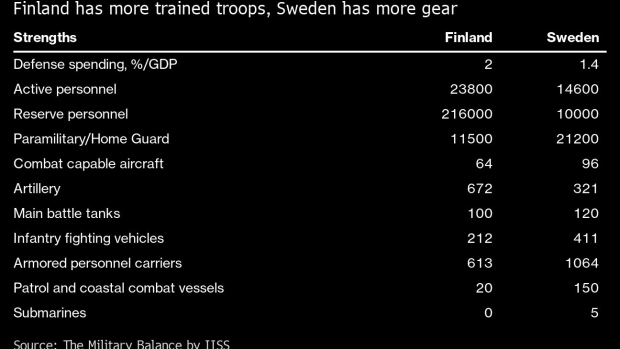May 15, 2022
Finland Applies to Join NATO to Deter Russian Aggression
, Bloomberg News

(Bloomberg) --
Finland is applying to join defense alliance NATO to deter potential aggression from Russia as its neighbor wages a full-scale war in Ukraine.
The formal decision was taken on Sunday and requires sign-off by the parliament, President Sauli Niinisto said at a press conference in Helsinki. It comes just days after Niinisto and Prime Minister Sanna Marin said the Nordic country “must apply for NATO membership without delay.”
The plan has a wide backing in the parliament in Helsinki.
Finland was driven into the fold of the North Atlantic Treaty Organization by Russia’s Feb. 24 invasion of Ukraine, and is pulling neighboring Sweden along, with a decision by the ruling party in that country slated for later today in Stockholm. The attack shifted popular opinion overnight, with policy makers rapidly kicking off the process to join.
“It is an absolutely monumental change politically, in those countries, because they’ve had the opportunity now for three decades to join NATO, and Sweden for even longer than that, but chose to remain outside,” Elisabeth Braw, senior fellow at the American Enterprise Institute, said by phone before the decision. “This is really an extraordinary step and a huge development, politically.”
The move has been called the third defining moment in Finnish history, completing the Nordic nation’s century-long aspiration to be considered a fully fledged part of the west.
Having won independence in 1917 after more than 100 years as a Grand Duchy of the Russian Empire, Finns fought two wars with the Soviet Union, ceding parts of their territory in 1944. Finland then tiptoed through an era of neutrality during the Cold War -- by necessity, not by choice -- cowering to Moscow while retaining independence in a policy that came to be known as Finlandization.
After the collapse of the Soviet Union, the Nordic country immediately sought entry into the European fold in Sweden’s wake, with the two joining the European Union in 1995.
Survival
A former president, Mauno Koivisto, was once asked what the idea of Finland is, if not a part of Russia. His famous one-word reply: “Survival.”
In that spirit, the country of 5.5 million people has always remained on alert. It’s guarding a border roughly 1,300 kilometers (800 miles) long, has a reserve of 900,000 troops and is able to deploy 280,000 of them in war time. It’s held on to a conscription-based system where most men and some women undergo military training lasting from six months to a year.
Finland’s military equipment are compatible with NATO gear and include a large number of artillery and tanks. The country in December decided to buy 64 Lockheed Martin Corp. F-35A multi-role fighter jets to replace its aging F/A-18 Hornets in a 10 billion-euro ($10.4 billion) procurement.
“Finland will maximize its security and that is not away from anybody,” Niinisto said.
Neighboring Sweden’s ruling Social Democrats are on Sunday planning to disclose their stance to NATO membership, just as policy makers are seeking to calm concerns that Turkey could derail their bid, citing concerns over Kurdish “terrorists.” The Nordic countries were met with widespread support by NATO foreign ministers gathering in Berlin on Saturday and Secretary General Jens Stoltenberg has repeatedly said the two would be warmly welcomed. The military bloc brings in new members unanimously.
President Niinisto phoned Russian President Vladimir Putin on Saturday to say the Nordic country plans to seek NATO membership. The move would be a “mistake because there are no threats to Finland’s security,” Putin told his Finnish counterpart, according to a statement from the Kremlin, adding that it could harm relations between the countries.
Russia has hinted at the prospect of more troops on the border, or bringing nuclear weapons into its Baltic exclave of Kaliningrad in response.
“This is a card the Russians have been playing since 2014 and onward,” said Anna Wieslander, director for Northern Europe at the Atlantic Council. “We believe that they have had such weapons in Kaliningrad already since 2018 and have taken precautions due to that.”
According to a recent survey, 84% of Finns think that Russia poses a significant military threat, and they’re nearly unanimous in saying their neighbor is “unstable and unpredictable” with just 2% rejecting that characterization of Russia. Policy makers say there’s no immediate threat.
“There’s nothing new in Russia opposing NATO membership of Finland, and Sweden as well,” Atte Harjanne, lawmaker for the Greens and a member of the parliament’s defense committee, said in an interview on Bloomberg TV on Friday. “It’s natural that as we move forward they will show some kind of a protest,” but “I’m not too worried, we’re prepared.”
(Updates with comment from president, adds background)
©2022 Bloomberg L.P.






